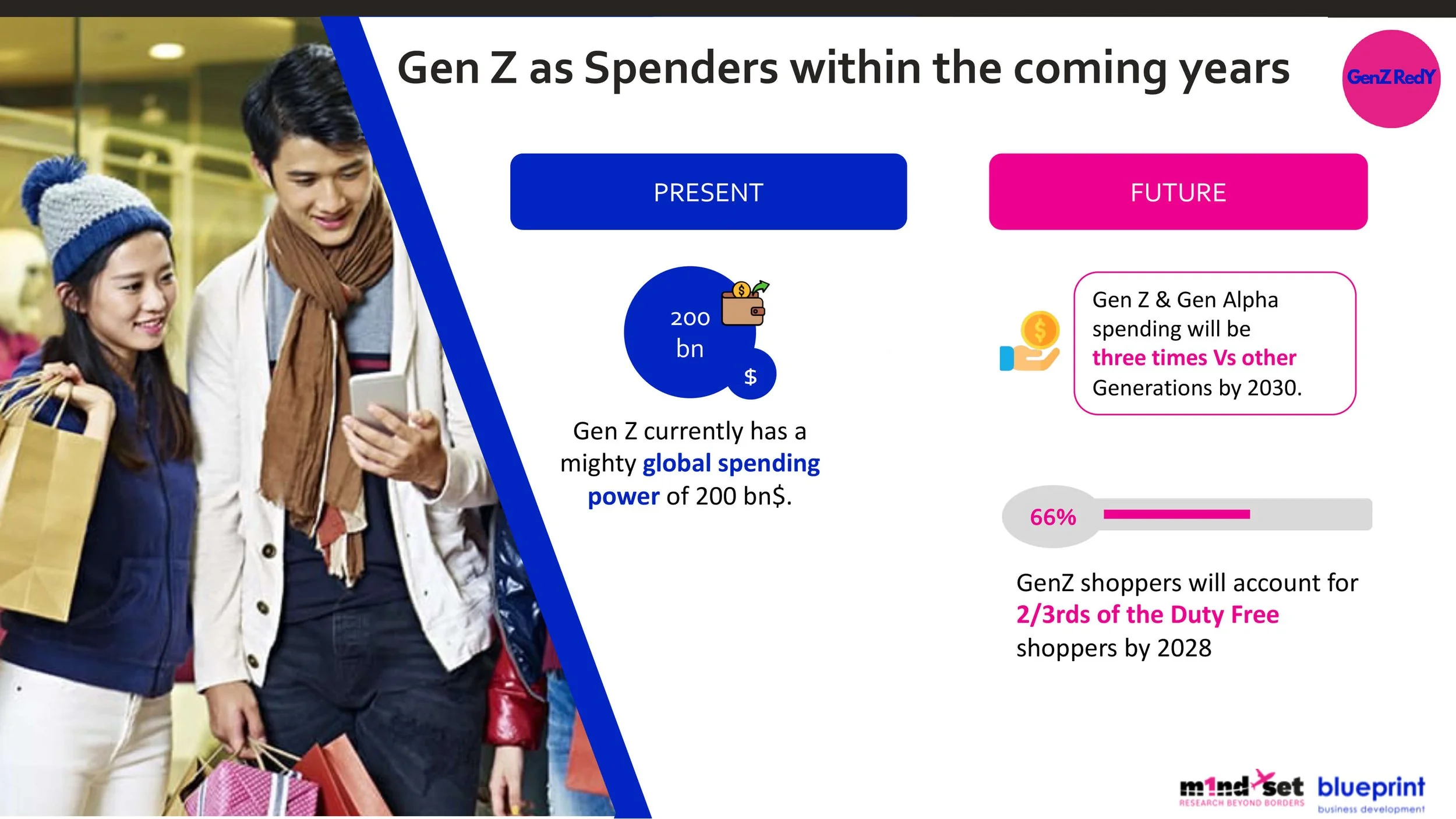Blueprint says TR industry finding innovative strategies to engage Gen Z
Kaneko Henningsen and Walter expressed the “tremendous pleasure” of visiting the new airside expansion at Stockholm Arlanda Airport. Swedavia and concessionaire partners have build a best-in-class shopping environment
The travel retail industry is actively experimenting with approaches to effectively engage Gen Z travelers, with several industry stakeholders at the forefront of adopting innovative strategies to cater to Gen Z’s evolving demands and preferences, according to Blueprint Partners Thomas Kaneko Henningsen and Karl Walter.
While this cohort currently represents 30% of the world’s population and 9% of today’s travelers, it is expected to account for two-thirds of duty-free shoppers by 2028. By 2030, EMEA and APAC regions alone will include more than one billion Gen Zs.
As Kaneko Henningsen and Walter explain, “It is important to stress that Gen Z is so much more than just an age group. It is becoming a global lifestyle endorsed by a wide range of consumer profiles across all age groups.”
Partner Thomas Kaneko Henningsen states, “These are extraordinary times as the travel retail industry acknowledges that the shopping landscape is changing. We see operators, retailers and brands experimenting on all levels on how to engage more effectively with Gen Z travelers”
Industry stakeholders at the forefront
Lotte Duty Free has taken a creative approach by collaborating with popular K-pop music bands NCT Dream, Riize, and aespa on social media. Meanwhile, Avolta has introduced innovative technologies to enhance the shopping experience for Gen Z customers. At Zurich Airport, the retailer offers a “phygital” experience in its Haute Parfumerie store, combining physical scent testing with interactive technologies to create immersive and tailor-made shopping journeys.
Additionally, Avolta has implemented “lift and learn” technology, allowing consumers to pick up products and access detailed information about their unique selling points on digital screens integrated into the point-of-sale. This interactive and informative approach caters to Gen Z’s desire for engaging and personalized shopping experiences.
Other examples from the industry include Helsinki Airport’s launch of the “Relove” concept store, offering high-quality second-hand clothing and accessories. Similarly, ARI has introduced second-hand luxury products at its “Preloved” stores in Montreal Airport and Lisbon Airport, catering to Gen Z’s growing interest in sustainable and unique fashion options. Amsterdam Schiphol Airport has implemented initiatives such as providing free water to travelers, which has resulted in a reduction of over 700,000 single-use plastic bottles per year.
The future is phygital
The convergence of the physical and digital worlds is rapidly becoming a natural part of daily life, particularly for Gen Z consumers. Karl Walter points out, “According to m1nd-set – the worldwide leader in travel market research – Gen Z spends significantly more hours per day online. They are growing up in a world where there are no boundaries between online and offline. In fact, it is highly likely that their consumer habits are formed online way before they consume in offline environments due to social media algorithms.”
Gen Z spends significantly more time online than other generations
Walter highlights the growing trend of purchasing digital brand items that consumers also own in the physical world on gaming platforms like Roblox or Pokemon Go, which has become an integral part of life. He adds, “Or why not attend a phygital online beauty class in the Metaverse, as Shilla offered their VIP customers, who received Gucci samples at home before trying them online during the class?”
The influence of social media on consumer preferences is undeniable. “Today’s consumer preferences are constantly being shaped by influencers and bloggers posting about their personal preferences and travel experiences,” says Walter. “A post about the experience in your airport store can reach millions of consumers within a few days and will have a notable impact on your performance.”
More than other age groups, Gen Z relies on peers and friends to decide which brands to trust
Travel retail stakeholders are actively embracing digitalization and phygital experiences through various initiatives, regardless of how they leverage social media to keep consumers informed and interested before they travel. For instance, Changi Airport has built its own metaverse by replicating and gamifying the airport on Roblox, creating a sense of belonging and setting expectations for travelers. Other stakeholders offer live shopping events and online consultations with their own in-store sales staff to build relationships with consumers before they arrive at the airport. In-store, retailers are implementing tools such as Fragrance Finders to help consumers discover the world of fragrances via their own mobile devices or on pre-installed tablets.
Walking the walk
According to m1nd-set, 54% of Gen Z, described as an “activist generation,” think it’s very important to buy from companies that protect and preserve the environment. This has not gone unnoticed by retailers and brands in travel retail.
Retailers have developed concepts and areas within their stores that focus on healthy and eco- friendly alternatives. Examples include promotion spaces such as “Great for you – better for the planet” from Heinemann, “Naturally delicious, conscious shopping” from ARI, and the “Body Mind Soul” area within duty free stores at Avolta. These initiatives have provided opportunities for purpose-driven brands to emerge, from Tony’s Chocolonely’s mission towards 100% slave-free chocolate to plastic-free chewing gum like True Gum and healthy snacking alternatives like True Dates.
Established brands are also focusing on the environment, with Nestlé’s biggest launch of the year being its TR-exclusive “Nestlé Sustainably Sourced” chocolate. Nestlé Sustainably Sourced effectively combines Nestlé’s Swiss chocolate expertise with sustainability, and is a direct result of Nestlé’s work with the Rainforest Alliance to support cocoa farmers and their communities.
Gen Z will be the largest traveling age group by 2028
Walter notes, “Their focus on wellbeing, animal rights, racism and LGBTQ+ issues has as much impact on their shopping behavior as eco-friendly practices do.” Companies need to police themselves on all these topics as well; otherwise, Gen Z will.”
As Karl Walter highlights, “The activism that Gen Z puts on display goes far beyond eco- friendliness, which in today’s world should be considered a ‘given.’”
Curated communities
When it comes to personalized services and consumer loyalty in travel retail, the key word is “relevance.” As Thomas Kaneko Henningsen explains, “Relevance as a driver is nothing new to the industry. Since 1947, travel retail has excelled at driving relevance in the form of tax-free pricing, limited edition products, travel exclusives, novelty shopping experiences, sense of place, etc.” However, the definition of relevance is changing dramatically with the influx of Gen Z travelers, the world’s first digital natives.
Gen Z will account for approximately 66% of duty free shoppers by 2028
According to m1nd-set, Gen Z travelers spend globally on average 20% less in airport duty free stores, with significantly lower conversion rates. This reduced spend is attributed to products being less relevant to Gen Z. Kaneko Henningsen points out, “This raises the question: how do we make existing products, services and experiences more relevant going forward?” A big part of the answer lies in digitalization powered by artificial intelligence (AI).
As Gen Z invests so much of their time on devices, they become part of a global community of like-minded people who exchange reviews, insights and opinions, and also socialize. Therefore, industry stakeholders must embrace digital capabilities to engage with younger travelers more effectively. Kaneko Henningsen comments: “Chatbots powered by AI feel far more natural now than a few months ago. Equipped with human-like tone of voice, vocabulary and even friendly faces, AI make the interaction with travelling customers far more seamless, personal and emotional.”
Strategic collaborations
In the travel retail industry, data sharing and networking between operators, retailers and brands are more crucial than ever for creating a seamless and engaging consumer experience. Kaneko Henningsen says, “The proactive and mutually beneficial collaboration between industry stakeholders is more critical than ever.” This collaboration is essential to develop a Gen Z-friendly community, where the sense of belonging is paramount, requiring stakeholders to unite and elevate the customer.
A prime example of successful collaboration is seen in the partnership between Qatar Airways, Hamad International Airport and Qatar Duty Free. These three entities have created a seamless travel experience built around exceptional service. Their efforts have earned them prestigious awards such as “World’s Best Airport” and “World’s Best Airport Shopping” by Skytrax, as well as “World’s Best Business Class” and “World’s Best Business Class Lounge.”
Brands have committed to this journey of excellence by introducing innovative concepts like the first Louis Vuitton lounge and the first Christian Dior spa at Hamad International Airport. Kaneko Henningsen notes, “Going forward, airports, airlines, retailers and brand collaborations will become ‘destinations’ where experiences will reach new heights.”
“The Gen Z lifestyle is ushering in a new era in travel retail. As more consumers embrace Gen Z values, we are witnessing fundamental changes in shopping behavior. Yesterday’s success will no longer guarantee tomorrow’s success. The need to understand and embrace Gen Z lifestyle is more important than ever.”






